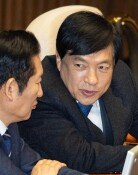Has the Korean Economy Bottomed Out?
Has the Korean Economy Bottomed Out?
Posted April. 25, 2009 05:54,
○ Govt stimulus prevents steep fall
Gross domestic product in the first quarter grew 0.1 percent from the previous quarter thanks largely to aggressive stimulus measures by the government.
Facility investment fell 9.6 percent in the first quarter, down from the previous quarters minus growth of 14.2 percent. Manufacturing output also dipped 3.2 percent over the same period.
Government spending grew 3.6 percent and construction investment rose 5.3 percent from the previous quarter, however. Construction output also grew 6.1 percent.
Choi Chun-shin, in charge of economic statistics at the Bank of Korea, said, The early implementation of the government budget and a 16-percent rise in the infrastructure construction budget have played a big role in boosting economic growth.
The service sector and private consumption also saw slight gains. The slight warming in the service sector is attributed to the stock market rally. In addition, more loans and credit guarantees to smaller companies prevented the economy from plunging further, Choi said.
Kwon Soon-woo, head of the macroeconomic policy team at Samsung Economic Research Institute, said, The private sector, which is still in panic, is not in a situation to recover voluntarily.
At a time like this, government measures produced desirable effects by pulling the trigger of economic recovery.
○ Bottom not to lead to quick recovery
The Korean economys first-quarter performance has triggered heated interest in when the economy will bottom out. According to the business cycle, the bottom refers to the moment right before the economy starts recovery, lifting itself out of a recession. The exact judgment on when the bottom is possible two or three years later.
The Bank of Korea, however, sees potential economic growth as a yardstick for the bottom. Choi said, Some interpret the first-quarter economic expansion as a signal that the economy might have hit bottom. But we believe that the economy has continued to contract since the second quarter of last year.
If quarter-to-quarter GDP growth reaches the countrys potential growth rate, we can say when the economy will hit the bottom. Considering Koreas potential growth rate is around four percent, if quarter-to-quarter growth reaches one percent, it can be said that the economy hit bottom in the previous quarter.
Kim Jae-cheon, in charge of economic surveys at the bank, was pessimistic over the impact of the bottom. The economy might hit bottom in the second half of the year, but the pace of recovery is so slow that economic players will not feel the effect of the recovery, he said.
If growth reaches 3.5 percent next year as the central bank expects, Kim said it will hit bottom in the latter half of the year, though the expansion falls short of the potential growth rate.
The central bank is wary of predicting the bottom because its judgment is directly linked to its monetary policy. A high-ranking bank official said, If it becomes clear that the economy has bottomed out, the central bank should set out to absorb liquidity, but its not the time to do so.
The bank will stick to liquidity easing for the time being.
○ Manner of recovery important
Private sector experts also said it will take time for the country to achieve full-fledged recovery though the economy has hit bottom. The International Monetary Fund downgraded Koreas economic growth forecast for next year from four percent to 1.5 percent.
Kwon said, Risk factors abound in the global financial market so now is not the time to lower our guard.
Koreas economy is now in the process of identifying the bottom. What is important is not when the economy bottoms out but how the economy recovers, he said, implying a prediction of a U- or L-shaped recovery.
Certain economists warned against the double dip phenomenon, saying a full-fledged industry-wide corporate restructuring can force the economy to decline again by aggravating unemployment and hurting domestic consumption.
Song Tae-jung, a senior researcher at Woori Financial Group, said, If the economy continues to expand until the second quarter on a quarter-on-quarter basis, a sudden drop cannot be ruled out.
Temporary increases in fiscal spending might have brought the expansion, so we should watch at least until the third quarter of the year. After that, we can accurately forecast economic prospects.
jaeyuna@donga.com



![“잠만 자면 입이 바싹바싹”…잠들기 전에 이것 체크해야 [알쓸톡]](https://dimg.donga.com/c/138/175/90/1/wps/NEWS/IMAGE/2026/02/23/133404749.3.jpg)



